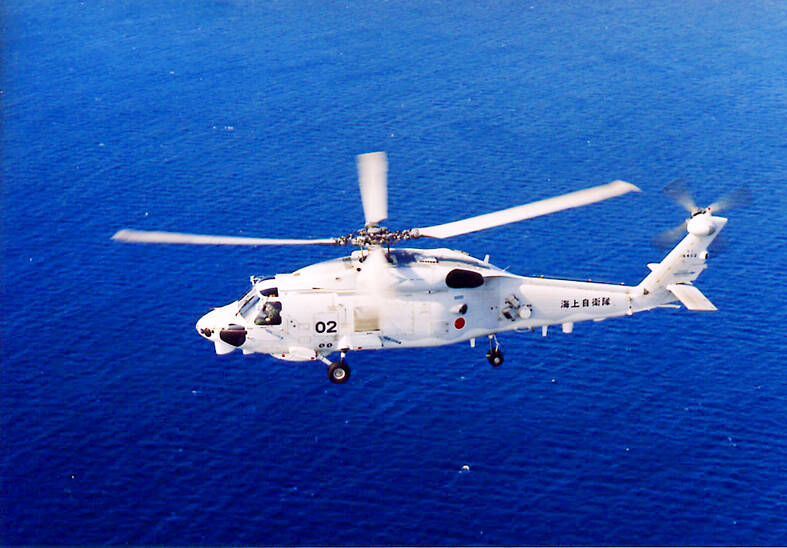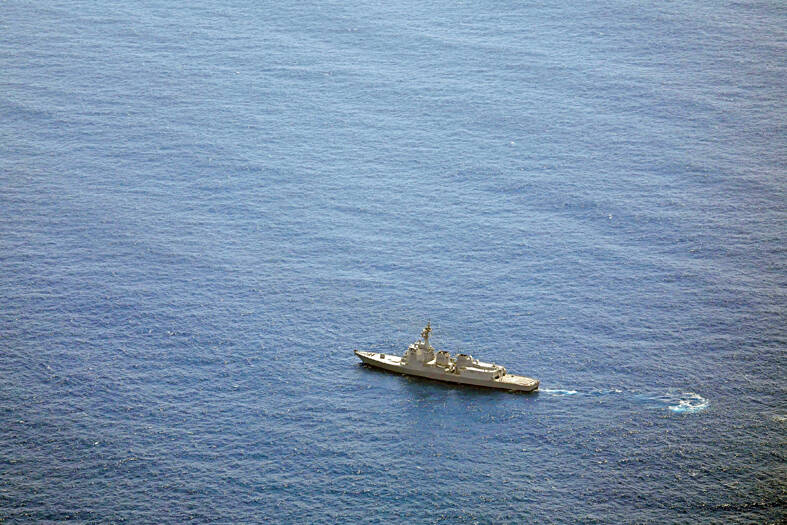Two Japanese navy helicopters carrying eight crew members crashed in the Pacific Ocean south of Tokyo during nighttime training in a possible collision, leaving one dead while rescuers yesterday searched for seven others missing, the defense minister said.
The two SH-60K choppers from the Japan Maritime Self-Defense Force were carrying four crew each and lost contact late on Saturday near Torishima Island, about 600km south of Tokyo, Japanese Minister of Defense Minoru Kihara told reporters.
The cause of the crash was not immediately known, but officials believe the two helicopters “highly likely” collided before crashing into the water, Kihara said.

Photo: EPA-EFE / JAPAN MARITIME SELF-DEFENSE FORCE
Japan Maritime Self-Defense Force Chief of Staff Admiral Ryo Sakai said that training involving the SH-60s would be suspended until the cause of the crash is determined and preventive measures are adopted.
Rescuers recovered a flight data recorder, a blade from each helicopter and fragments believed to be from both choppers in the same area, signs that the two SH-60Ks were flying close to each other, Kihara said.
Search-and-rescue efforts for the missing crew were expanded yesterday with the deployment of 12 warships and seven aircraft. Japan Coast Guard patrol boats and planes also joined the operation.

Photo: Kyodo News via Reuters
US Ambassador to Japan Rahm Emanuel offered his country’s help with the search and rescue.
“We will stand together, side by side, with our friend and ally, Japan. My thoughts are with the crew members, and their families and friends during this challenging time,” he wrote on X.
They were on nighttime anti-submarine training, Kihara said.
One lost contact at 10:38pm and sent an automatic emergency signal a minute later.
Only one distress signal, called an emergency locator transmitter, was heard — another sign the helicopters were near the same place, because their signals use the same frequency and could not be differentiated, Kihara said.

MORE VISITORS: The Tourism Administration said that it is seeing positive prospects in its efforts to expand the tourism market in North America and Europe Taiwan has been ranked as the cheapest place in the world to travel to this year, based on a list recommended by NerdWallet. The San Francisco-based personal finance company said that Taiwan topped the list of 16 nations it chose for budget travelers because US tourists do not need visas and travelers can easily have a good meal for less than US$10. A bus ride in Taipei costs just under US$0.50, while subway rides start at US$0.60, the firm said, adding that public transportation in Taiwan is easy to navigate. The firm also called Taiwan a “food lover’s paradise,” citing inexpensive breakfast stalls

TRADE: A mandatory declaration of origin for manufactured goods bound for the US is to take effect on May 7 to block China from exploiting Taiwan’s trade channels All products manufactured in Taiwan and exported to the US must include a signed declaration of origin starting on May 7, the Bureau of Foreign Trade announced yesterday. US President Donald Trump on April 2 imposed a 32 percent tariff on imports from Taiwan, but one week later announced a 90-day pause on its implementation. However, a universal 10 percent tariff was immediately applied to most imports from around the world. On April 12, the Trump administration further exempted computers, smartphones and semiconductors from the new tariffs. In response, President William Lai’s (賴清德) administration has introduced a series of countermeasures to support affected

CROSS-STRAIT: The vast majority of Taiwanese support maintaining the ‘status quo,’ while concern is rising about Beijing’s influence operations More than eight out of 10 Taiwanese reject Beijing’s “one country, two systems” framework for cross-strait relations, according to a survey released by the Mainland Affairs Council (MAC) on Thursday. The MAC’s latest quarterly survey found that 84.4 percent of respondents opposed Beijing’s “one country, two systems” formula for handling cross-strait relations — a figure consistent with past polling. Over the past three years, opposition to the framework has remained high, ranging from a low of 83.6 percent in April 2023 to a peak of 89.6 percent in April last year. In the most recent poll, 82.5 percent also rejected China’s

PLUGGING HOLES: The amendments would bring the legislation in line with systems found in other countries such as Japan and the US, Legislator Chen Kuan-ting said Democratic Progressive Party (DPP) Legislator Chen Kuan-ting (陳冠廷) has proposed amending national security legislation amid a spate of espionage cases. Potential gaps in security vetting procedures for personnel with access to sensitive information prompted him to propose the amendments, which would introduce changes to Article 14 of the Classified National Security Information Protection Act (國家機密保護法), Chen said yesterday. The proposal, which aims to enhance interagency vetting procedures and reduce the risk of classified information leaks, would establish a comprehensive security clearance system in Taiwan, he said. The amendment would require character and loyalty checks for civil servants and intelligence personnel prior to